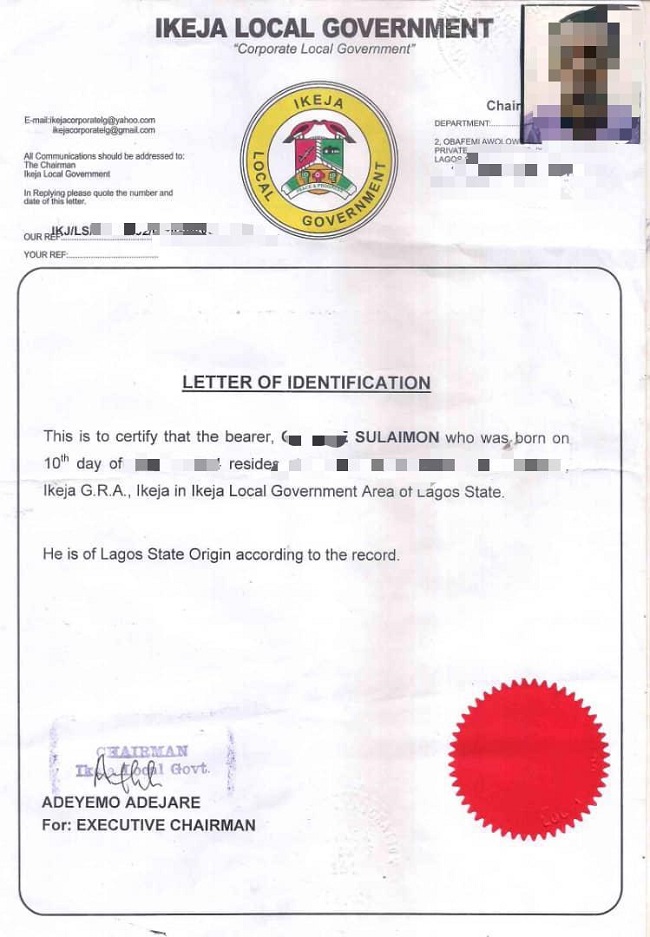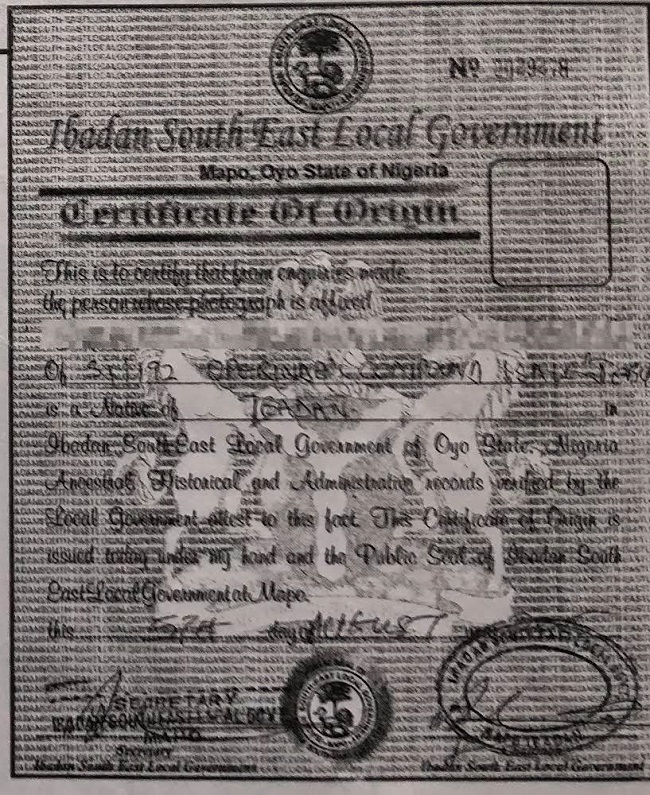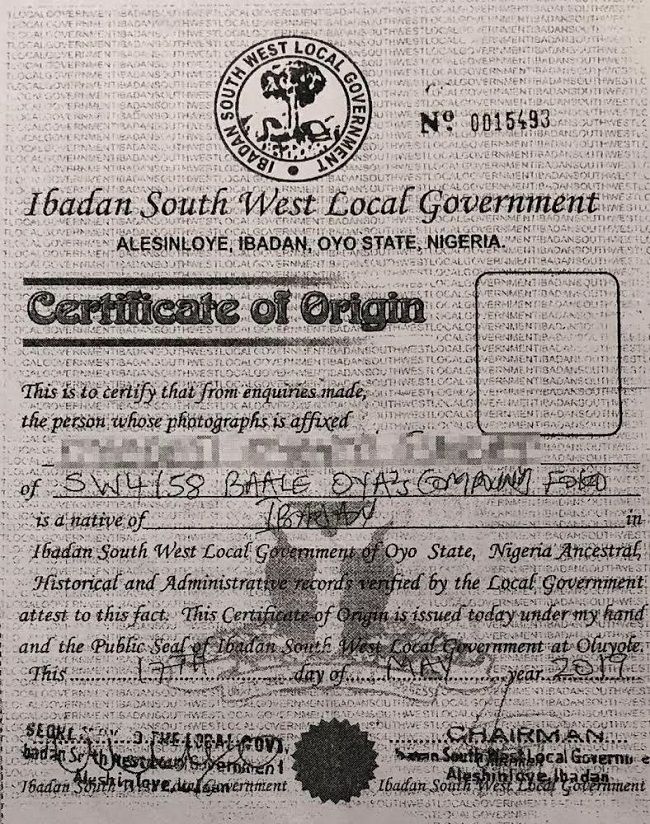By: Adekunle Sulaimon
In a normal system, getting state identification certificates by indigenes should be a simple exercise while it should be difficult for non-indigenes to get the document. This, however, is not the case with several local government secretariats across the country. ADEKUNLE SULAIMON visited some local governments in Oyo and Lagos States and reports that to collect a state identification certificate, all that is required is the payment of as little as N3,000 to agents in different local government areas.
She greeted this reporter warmly and stylishly steered him to a quiet corner, away from prying eyes, before saying, “What do you want?” The reporter replied: “Certificate of origin. I need it for clearance in school. See, I am not from Oyo State but I am claiming to be an indigene of the state because I want my admission to be easy.”
The venue was Mapo, headquarters of Ibadan South-East Local Government Area of Oyo State.

The woman, who appeared to be in her 50’s and was wearing a pair of glasses, interjected, “It’s okay. I know what you are talking about. There have been several other persons who had come here today for the same purpose. No fewer than 30 people come here daily to get a certificate of origin and we provide it for them.”
The woman told this reporter that there were a number of compounds from which he could safely claim to hail from. She warned him against some which she said could easily raise suspicion. She thereafter said the fee was N5,000. She said the charge was that much because getting Ibadan South East Local Government’s certificate was particularly taxing. She claimed that there were too many hurdles to cross before it could be acquired. She stated that there were officials charged with the signing of the document and there were others whose job is to ascertain that an applicant is truly from where they claim to be from.

During the course of the negotiation, she put a call through to one of the people that worked with her within the council. But when this reporter insisted on paying N2,500, she said it was impossible to obtain the document for that price and then advised him to choose Ibadan South-West which she claimed was cheaper and already prepared with the appropriate signatories, noting that even that would cost N3,000.
She said: “There is no local government that charges below N2,000. In fact, others charge between N8,000 and N15,000, depending on your bargaining power.”
When asked the reason for the varying prices, she said, “You cannot compare Bodija in Ibadan North with Ibadan South-East. The people that come from that place are classier than the people here. So, getting a certificate of origin from that kind of local government is not going to be lower than N20,000. Some people have about three different certificates of origin so that they could claim to be from different states while applying for positions in the army, the police and the navy. Some even get the document to bid for contracts.”
Transactions without receipts
The negotiation went on for an hour before she finally agreed to collect N3,000 to get the reporter the certificate. She used a piece of paper to record the reporter’s information, including the false family compound name. The agent had no work station or official recording materials to indicate that the information would be properly logged in. After an agreement was reached, she took the reporter to an office where tax-related issues and motor licensing are managed, told the reporter to take a seat. She disappeared for 21 minutes and reappeared with the certificate bearing the name and compound, including the false address supplied boldly written on it.

She collected her money in cash, rejecting any other form of payment. She turned deaf ears to a request for a receipt of the transaction. The reporter requested for another certificate for a friend who couldn’t come but who asked for the already prepared Ibadan South West Local Government’s certificate. She asked to speak with someone on the telephone. The quest to make more money made it impossible for her to demand that the person come personally. She said, “I want to do you this favour, and I hope you will not deceive me when you want to pay the balance of N1,000 for your friend. You know that I will check in at the end of the month, too. Ijoba a gbaowo won o (the government will take its money),” she said. That conversation ensued when the reporter claimed not to have enough money to settle the bill for his fictitious friend’s certificate. She provided her account number and ascertained that money had been sent into it before going for the stamp pad and ink.
Saturday Tribune visited Ikeja Local Government secretariat in Lagos State too on August 28. There were many people, especially young men, hanging around within the vicinity right from the entrance, jostling to attract customers. This reporter approached a female clerical staff seated in one of the offices near the entrance and explained what he wanted, laying emphasis on the fact that he wasn’t from Lagos State. The female staffer asked for N30,000. Notwithstanding, she collected N18,200 from him after a hard bargain and took him to the person that would prepare the certificate. Here, there was no delay at all. In 10 minutes after payment, the certificate was ready.
It was gathered that only indigenes of the local government are allowed to obtain the certificate at N8,000, while non-indigenes pay N30,000 and a N200 administrative charge. It was learnt that staff members at council secretariats are not concerned about perjury which is a serious criminal offence punishable under the law with a fine or jail term or both upon conviction.
On September 6, the Commissioner representing Lagos State at the Federal Character Commission (FCC), Abdulwasiu Bawa-Allah, lamented that letters of indigeneship and clearance issued by local governments in the state would no longer be acknowledged effective from December 2020. This, he said, was due to the massive number of non-indigenes buying the state of origin certificate to apply for the ongoing police recruitment exercise. He said: “More than half of the total number of candidates who applied for the constable cadre of the Nigeria Police Force, claiming Lagos origin, presented fake certificates of origin for the recruitment exercise. Similarly, letters from Obas and chiefs will go through some level of scrutiny because some of them are in the habit of issuing certificates of origin to non-indigenes of Lagos State.

“It is when we are able to address these problems and nip them in the bud that we can say we have attained equity in the appointment of Lagosians into the over 120 federal institutions across the state. As it stands, representation of Lagos State indigenes in federal institutions is below the statutory 2.5 per cent.”
Unending anomalies
The Human Rights Watch (HRW), in a 2009 report, said official policies and non-official practices have led to the marginalisation and exclusion of non-indigenes, as many states refuse to employ non-indigenes in their state civil services, denying them the right to compete for academic scholarships while they discriminate against them in political participation and the provision of basic services and infrastructure, thus giving them the status of second-class citizens.
In order to avail themselves of opportunities, people falsely claim states they are not from. Tolu (surname withheld), a graduate of the University of Ilorin, told Saturday Tribune that he was denied admission in several attempts to study in the school because he wasn’t an indigene of Kwara State.
“I applied to study at the University of Ilorin three times and was denied until a friend who was a student there told me that the school gives admission to only a few non-indigenes. He then advised that I claim to be an indigene by acquiring the state’s certificate of origin and fortunately, I got admission the year I acquired the certificate with even a lower score compared to my previous post-UTME scores,” he said.
Aisha (surname withheld), a post-graduate student at the Bayero University, Kano, narrated a similar experience. The 27-year-old lady said she had to get a certificate of origin from one of the ’Educationally Less Developed States or Disadvantaged States (ELDS) to get admission in her undergraduate days. “I got admitted into Ahmadu Bello University the year I got Shiroro Local Government certificate in Niger. I didn’t appear, my uncle got it for me and despite having 194 in JAMB, and an average score in Post-UTME, I was considered,” she said.
Kudirat (surname also withheld) said she got her international passport without providing all the required documents in the immigration office after paying N55,000 for a passport that was meant to be obtained between N12,000 and N20,000.
“The day I went for capturing, I was surprised to see a certificate of origin of Atakumosa West Local Government in my file. I am not even from Osun State. In fact, I only have my business there. How I became an indigene of the local government is still a shock to me,” she stated.
One Agbor also told Saturday Tribune that he once got about three certificates of origin in Delta and Anambra States in order to get a civil service job.
A corps member from another Southwest state (names withheld), in order to apply as a teacher in the ongoing Oyo State Teachers’ recruitment, got the certificate of origin from a local government in the state at N3,000.
Importance, procedure of acquiring a certificate of origin
Certificate of origin is the evidence of where one hails from and is an official identification in the country. In Nigeria, it is used for various administrative purposes like scholarship schemes, employment/job placements, getting admission into institutions of higher learning, contesting for elective positions or getting political appointments.
The National Identity Management Commission indicates that a state of Origin certificate is required, among other documents, as a proof of one’s identity to acquire the National Identity Number (NIN) enrolment while the Nigerian Defence Academy, on its website, states that as a requirement for admission into the Academy for a regular course, ‘a local government certificate of origin must be presented and a certificate of state indigeneship from the office of the state governor is desirable’. Also, some tertiary institutions ask for it to differentiate between indigenes and non-indigenes to fix school fees and bursary allocation.

A research conducted by a law firm in Lagos State showed that there is no difference between the ’certificate of state of origin’ and the certificate of origin/indigene/indigenity, elaborating that different states or local governments use different terminologies and that there is no unified format.
In 2005, another report by the United Nations Special Report on Minority Issues, in a summary submitted to the Human Rights Council on a mission to Nigeria said, “Those interviewed for the report described a socially entrenched distinction between those recognised as the original inhabitants of a state (indigenes) and those who are not (settlers).” The report further said that the constitution does not provide a definition of ‘indigene’ or ‘settler’ status, and that community and civil society representatives repeatedly highlighted the relevance of the categorisation of indigenes/settlers at the state and local levels in Nigeria–and its profound impact on people’s lives.
Invariably, obtaining a certificate of origin has no standard procedure but the conventional practices which include a visit by the applicant to the state liaison office with at least two passport-size photographs. Some state offices design application form which the applicant must fill to provide the required information. The applicant may be required to produce some form of identification and pay a certain fee for the processing of the certificate (this fee is not uniform across all states). The rule is that the certificate must be collected by the applicant personally.
Lack of law guiding processes
According to the 2014 policy brief by the Nigeria Research Network, Local governments are left with the administrative task of certifying who is an indigene of their respective jurisdictions. Be that as it may, the guiding principles of the Federal Character Commission clarifies that an indigene of a local government area is anyone ’accepted’ as such by only the local government. This leaves enormous discretionary powers in the hands of local government officials. Research by the organisation indicates that “administrative practices concerning indigeneity vary considerably across Nigeria’s 774 Local government areas and there were many reports of corruption in the process of issuing certificates.”
The 2015 report by the UN Special Rapporteur on minority issues also stipulates that long term residency in a state, even if for generations, is not considered a criterion that entitles a person or community to be considered indigenes, and therefore long-term residents are often denied indigeneship certificates.
Speaking on the issue, a lawyer, Adesanya Adebisi, highlighted the measures required to obtain a certificate of origin as approaching the local government with a letter of identification from one’s local chief or councillor who will confirm the person as an indigene, verification from the local government and payment of a prescribed fee to the local government.
He confirmed that no law guides the process and that they are just mere administrative conveniences. ”There is no constitutional requirement for obtaining a certificate of origin. That’s why it is possible for a non-Yoruba person to be in government in the Yoruba states.”
“Section 25, 26 and 27 of the 1999 constitution of the Federal Republic of Nigeria does not focus on indigeneity but only on citizenship and nationality,” he added.
Need to curb irregularities
Dr Lamidi Kazeem, a lecturer in the Department of Local Government and Developmental Studies, Obafemi Awolowo University, Ile Ife, said in the past, there were debates that local government certificate of origin should be called a certificate of residence, something that can match up with the certificate of identification used in UK and US. He added that there are no constitutional provisions that provide clear procedures for the acquisition of local government certificate of origin but it is a constitutional right for local governments to provide an identity to its citizenry.
The don added: “It is highly immoral to claim a local government one does not belong. If Nigeria wants to reorder the trend and trajectories of the development in the country, acquiring a certificate of origin should be one of the chief functional concerns, that for everything one wants to get, even enrolment into schools; one must get the certificate. And it should also form part of social demographic figures that will have our identity management base. The government should have appropriate records of an individual in their database where the information about every person, can easily be accessed. The racketeering in certificate collection is what should be controlled and the best way to control it is to set out a section and subsection in the constitution that will provide for the procedure of its acquisition.
“The traditional institution will do the verification and identification and then forward the request to the local government for the issuance of a certificate to the person requesting it while the National Bureau of Statistics (NBS) and the National Identity Management Commission (NIMC) should work hand in glove to keep adequate records provided by the local governments saddled with the responsibilities of identifying the people in various communities of their territories.”
Data bank is the solution ― Expert
Mr Charles Adeyemi, a political and governance communications expert said there is a need to go back to the old ways of obtaining the certificate of origin, adding that traditional institutions need to be adequately carried along.
According to him, since the family is the smallest unit, then no certificate must be issued without the identification or verification of the process before issuance. He said: “If the federal government works hand in glove with the state government to fortify the local governments who are saddled with menial responsibilities, there wouldn’t be a problem of people claiming false state of origin. A data bank will also help in ameliorating the processes of the issuance of a certificate of origin because once you collect one, it is recorded and you cannot collect another and this will stop the fraudulent practice.”
YOU SHOULD NOT MISS THESE HEADLINES
At 60 Nigeria Must Fight For Independence, Says Bishop Badejo Of Oyo Catholic Diocese
As Nigeria celebrates its 60th Independence Anniversary, Most Reverend Emmanuel Adetoyese Badejo, the Bishop, Catholic Diocese of Oyo in his message on the occasion…council workers falsify information council workers falsify information council workers falsify information
Eight Injured, 20 Vehicles Destroyed As PDP, APC Supporters Clash Again In Ondo
No fewer than eight persons were seriously injured during a clash between the supporters of the Peoples Democratic Party (PDP) and the ruling All Progressives Congress (APC)…council workers falsify information council workers falsify information council workers falsify information
Oba Of Benin Warns Wike, Others: We Don’t Want Godfathers For Our Gov
Benin monarch, Omo N’Oba N’Edo Uku Akpolokpolo, Oba Square II, has called on the Peoples Democratic Party, PDP, not to turn itself to another godfather to the reelected governor of Edo State, Godwin Obaseki…council workers falsify information council workers falsify information
WATCH TOP VIDEOS FROM NIGERIAN TRIBUNE TV
- Let’s Talk About SELF-AWARENESS
- Is Your Confidence Mistaken for Pride? Let’s talk about it
- Is Etiquette About Perfection…Or Just Not Being Rude?
- Top Psychologist Reveal 3 Signs You’re Struggling With Imposter Syndrome
- Do You Pick Up Work-Related Calls at Midnight or Never? Let’s Talk About Boundaries







